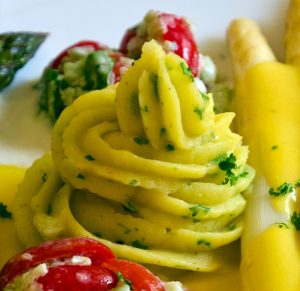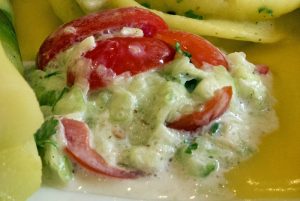Here is a light asparagus menu, inspired by traditional German recipes for this ‘white gold’ (including its green variety) and yet in harmony with Ayurvedic insights. Without eggs. We think you’ll enjoy preparing it!
Ingredients for 4 persons:
- White and green asparagus, 12 spears each
- 1 lemon or lemon juice
- Ghee
- 1–2 Tbsp. chickpea flour
- 1 Tbsp. spelt flour
- 100–150 ml coconut milk, if desired also cream
- Rock salt
- Cane sugar or Sharkara
- Nutmeg ground
- 1 tsp. each of lovage, marjoram, and chervil (dried or freshly cut)
- Saffron threads
- Parsley
- According to taste: black pepper
Preparation:
- Wash the asparagus and peel well, trim off a little from the bottom. Whether asparagus is enjoyed or not depends largely on how well it is peeled! Thin green asparagus does not need to be peeled, but it should be trimmed more. Add two thin lemon slices or some lemon juice, 1 tsp. of Ghee, salt and 2 pinches of sugar. Simmer on low heat for about 8 min. Add lovage, marjoram and chervil and simmer gently for another 2–3 minutes. Keep the asparagus warm.
- Heat the Ghee in a frying pan, stir in the chickpea flour and spelt flour. Stir well so there are no lumps.
Deglaze with one to two cups of asparagus water, stir well. Stir in the coconut milk (for vegans) and/or the cream. - Mix in a few crushed saffron threads (lightly pounded in a mortar). Sprinkle with nutmeg, add a little more asparagus water if necessary. Simmer on low for another 2 minutes.
Stir more frequently until the sauce takes on a gentle creamy consistence. Season to taste with salt, pepper and a pinch of sugar.
Arrange the asparagus and cover with the sauce. Garnish with green herbs.
Mashed potatoes the Ayurvedic way
Milk is often used for the preparation of mashed potatoes. However, according to Ayurvedic knowledge, milk doesn’t combine with foods containing salt, such as vegetables, potatoes, meat, and other savory foods. It is an incompatible combination, overly straining the digestive system.
Use floury potatoes for a mashed-potato dish. New-harvest potatoes are not so well-suited, as they bind less.
Ingredients for 4 people:
- 800g–1 kg potatoes
- 1/2 cup of coconut milk
- 3 Tbsp. of cream
- Approx. 1 cup of potato water
- 2-3 Tbsp. Ghee
- 1/2 tsp. of Vata Churna
- 4–5 pinches of ground nutmeg
- a few pinches of black pepper
- a pinch of Asafoetida
- Rock salt
- Fresh parsley, finely chopped
Preparation:
- Peel and wash the potatoes, cut in half or quarter depending on size. Cook with enough water and rock salt on low heat for about 20 minutes. Drain the potatoes but keep some of the cooking water.
- Use a whisk to mix the potato water thoroughly with the coconut milk and cream, heat it in a pot and add it to the cooked potatoes.
- Now mash with a potato masher to a delicate puree.
Heat the Ghee in a frying pan, sprinkle in the Vata Churna and Asafoetida, stir for a bit and then add to the puree. - Add nutmeg, black pepper and finely-chopped parsley and stir well once again. If necessary, season to taste with salt and additional coconut milk.
Raita – Ayurvedic cucumber salad
Raita is suitable as a small side dish for a well-seasoned lunch. Raita is very refreshing and can be served preferably on warm and hot days. Raita has a slightly cooling effect.
Ingredients for 4 people:
- 1 or 1/2 cucumber (depending on the size)
- 1 or 2 tomatoes
- ca. 150 ml whole-milk yogurt
- 1/2–1 tsp. of cumin seeds
- Salt
- Black pepper
- Fresh cilantro (coriander herb). You can also use parsley or dill.
Preparation:
- Wash, peel and grate the cucumber. Pour off a little cucumber water.
- Put the tomato in a bowl and scald with hot water. After about 2 min., peel off the skin.
- Remove the stem end from the tomato and cut the tomato into very small pieces.
- Mix the yogurt well with a blender. Mixing makes the yogurt liquid and easier to digest. Add the yogurt to the cucumber and tomato.
- Roast the cumin seeds briefly in a dry frying pan, then grind them with a mortar or coffee grinder. Mix the roasted cumin in with some pepper and fresh cilantro, season with rock salt.
Bon appetit!
Download the recipe as a PDF file.

Recipe and pictures: Jochen Lotz
© Maharishi Ayurveda Health Centre Bad Ems

